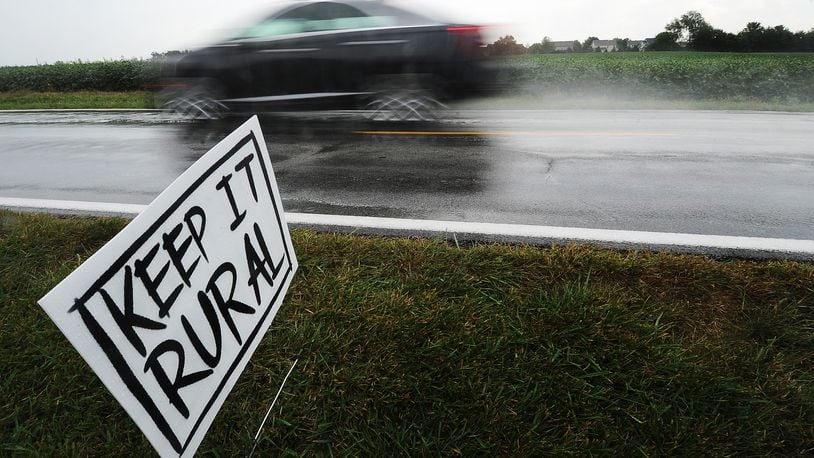If approved in March, the city’s income tax rate would rise from 1.5% to 2.5%, but this would be offset for some residents who work outside of Clayton by giving these residents full credit for taxes paid to other municipalities.
The city’s current income tax rate of 1.5% brings in $5.4 million annually, according to City Manager Amanda Zimmerlin. This revenue total would increase to a projected $7.9 million if the tax rate increase is approved.
Zimmerlin said this week the increase is needed for the continuation of services that residents are accustomed to.
The 2024 budget, which was approved after the levy failed in November, reduced or fully cut all non-essential services for the year to save money, she said.
“Leaf pick-up for 2024 faces the possibility of being drastically reduced or not completed at all,” Zimmerlin said in an email. “Community events such as Sweep Clayton Clean have been cancelled, and family events such as the Easter egg hunt and the Labor Day fireworks have also been cancelled.”
Additionally, Zimmerlin said the city declined to fill one open police officer position, one battalion chief position, and one full-time golf course grounds position, adding that if the levy fails to pass in March, the schools’ single resource officer would be diverted to maintain road patrol coverage.
In total, the city’s 2024 budget was reduced by $3.7 million compared to last year.
How the levy works
If the income tax measure passes, any Clayton resident working in a municipality with a local income tax rate of 1.5% or higher, such as Englewood, Trotwood, Dayton, Brookville, Huber Heights or Kettering, will see their overall tax bill to cities decrease, according to city officials and Dayton Daily News analysis.
If the measure passes, people who live in Clayton and also work within the city of Clayton, or live in Clayton and work in any jurisdiction without income tax, such as a township, will see their local tax bill increase.
Clayton residents currently get a 50% credit on their 1.5% Clayton city income taxes if they’re paying local taxes to another city. So according to the city, a family with $80,000 in taxable income would owe $1,200 in Clayton tax (1.5%), but would be credited half that amount and only have to pay the city $600 (on top of what they pay the city where they work).
If approved, the Nov. 7 ballot measure would change that to a 100% credit for taxes paid by Clayton residents to other municipalities. Meanwhile, the city would see increased tax collections from people who work in Clayton but live outside the city, as their rate would simply increase from 1.5% to 2.5%.
Clayton resident Jeremy Blanford said his taxes would not rise if the measure passes since he works in Dayton.
“I am in support of it,” he said Friday. “Personally, it would save me .75% because I pay Dayton 2.5% and I pay .75% to Clayton.”
Blanford said these savings would be especially helpful, as a recent revaluation of his home gave way to a “healthy increase” in property taxes.
Resident Alisha York said she feels the outcome in March will be similar to the November result. She also feels the city’s campaign strategy has been to push the 100% tax credit as a major advantage of the passing the levy, but York pointed out it’s a benefit not all will receive.
“Depending on who you talk to and where they work determines the answer you’ll get about whether they support it or not,” York said. “For example, my in-laws work in a township and don’t get taxed, so their tax is going to go up, but someone just down the street who works in a place with high taxes, they’ll benefit from it.”
Vote on housing proposal
Also set to appear on the March 2024 ballot for Clayton voters is a referendum allowing the electorate to have the final say on whether a plan to develop 125 single-family homes on a 43-acre parcel of land at the southeast corner of Phillipsburg-Union Road and Haber Road can move forward.
The Arbor Homes project has been a hot-button topic in the community since its proposal last March, with dozens of residents voicing concern during multiple council meetings.
In response to council voting last summer to approve a rezoning request and development plan for the project, a group of residents created a grassroots campaign, with the slogan “Keep it Rural,” successfully gathering nearly double the required amount of signatures to qualify the referendum for the ballot.
The grassroots campaign has amassed a Facebook following of over 1,200.
Blanford said he’s a supporter of the Keep it Rural campaign, but noted that he’s not anti-development.
“The proposal is to build houses on .25-acre tracts when the surrounding homes are all on 5-acre tracts,” he said. “We’re not opposed to development and we’re not opposed to the sale of the property.”
Blanford said he would be in support of the development if there was a stipulation that any homes built had to be on at least one acre of the land.
York and resident Doug Bias have helped lead the charge behind the Keep it Rural campaign. They echoed Blanford’s stance on the referendum issue.
“It’d be one thing if they agreed to even half-acre lots, but the high density that (Arbor Homes) is proposing is totally inconsistent with the homes that are already out there,” Bias said.
York said the swift momentum of the Keep it Rural campaign should tell city officials all they need to know.
“Council members always tell citizens to show up and speak out so they can have their voices heard, but we did and they didn’t listen,” she said, referring to last summer’s vote approving the rezoning and development plan. “I think that’s the biggest thing everyone — even if they don’t live out in the rural areas — is upset about.”
About the Author
